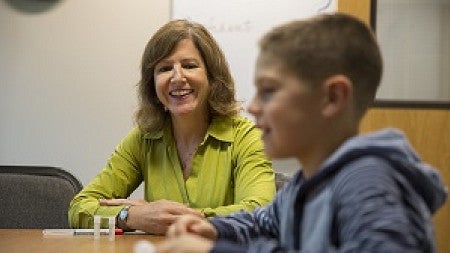EUGENE, Ore. — April 18, 2023 — Adopted children’s genetic characteristics can influence the parenting they receive, according to new research.
The findings, from the ongoing longitudinal Early Growth and Development Study, are described in a detailed publication released today in Monographs of the Society for Child Development. The research could be used to improve policies and interventions that seek to promote children’s positive social development and mental health.

“This study highlights the importance of shifting societal views from a ‘nature versus nurture’ perspective to instead focus on ‘nature via nurture,’” said Leslie Leve, Lorry Lokey Chair and Professor and scientist at the University of Oregon’s Prevention Science Institute, who co-authored the work. “Nature and nurture are intricately intertwined, and understanding how they work together will have a greater impact on programs and practices that promote children’s well-being than thinking about them as competing forces.”
A few major themes emerged from the work. Children’s genetic makeup can evoke specific parenting responses, and children’s genetic makeup influences the kind of parenting they need. Children’s genetic makeup can also accelerate or halt downward spirals of parent-child interaction.
“The themes reinforce the commonly held view that parenting is important for child development, while also showing that a child’s genetic makeup can bring about specific parenting responses, and can also influence the kind of parenting that helps children thrive, potentially interrupting conflictual cycles of parent-child interactions,” Leve said.
Supported by grants from multiple divisions of the National Institutes of Health, the Early Growth and Development Study has involved the cooperation of 45 adoption agencies in 15 states. The study is ongoing and has analyzed data from interviews, surveys, and direct observation of 561 children adopted shortly after birth, along with their birth and adoptive parents.
“Historically, there have been other important adoption studies in the field of psychology, but ours is the first to prospectively follow both adoptive and birth families since birth, gathering rich data from all parties in the adoption over more than a decade, with a focus on socialization processes and children’s social-emotional development,” Leve said.
This study moves researchers one step closer to enabling clinicians to increase the specificity of family-based interventions to better serve all children.
“The more we learn about how to best align specific parenting behaviors with specific child qualities, the better we will be at tailoring and adapting preventive interventions to best meet an individual child’s needs,” Leve said.
In addition to Leve, authors of the monograph are David Reiss, of Yale Child Study Center; Jody M. Ganiban of George Washington University; Jenae M. Neiderhiser of Pennsylvania State University; Daniel S. Shaw of University of Pittsburgh; and Misaki N. Natsuaki of University of California, Riverside.
“It’s been a tremendous opportunity professionally and personally to have played an integral role in this study for the past 20 years,” Leve said. “I went from being a postdoc who was still trying to fully understand the remarkable benefits of the adoption study design, to a mentor of students and postdocs who now lead their own research and papers within this study. I am consistently amazed by the teamwork and collaboration that this type of national study requires, and the new insights it delivers.”
About the College of Education
The College of Education at the University of Oregon is a community of leading researchers and practitioners dedicated to transformational scholarship, integrated teaching, and collaborative practice designed to enhance individual lives and systems. The COE is UO’s highest-ranking and largest research-contributing college known for its innovative teaching and research in special education, counseling psychology, human services, education, and prevention science. The COE is a leader in culturally responsive Indigenous and bilingual teacher preparation programs as well as community-based research. The COE’s renowned work creates a widespread, positive impact on our country’s schools year-to-year, all while contributing significantly to the University of Oregon’s research enterprise.
https://education.uoregon.edu/
About the Prevention Science Institute
The Prevention Science Institute at the University of Oregon is a multidisciplinary research institute focused on improving the lives of children, families, and adults through science, outreach, and program delivery. PSI includes faculty from across the UO who work together to understand prevention and health promotion through translational science and applied intervention research. PSI conducts research from multiple perspectives, including translational research that focuses on interactions between the brain, social context, and behavior; developing, testing, and delivering effective intervention programs; and efficacious ways to disseminate programs into community, agency, and school settings.
https://psi.uoregon.edu/
Media Contact:
Molly Blancett
blancett@uoregon.edu
541-515-5155
Source:
Leslie Leve
Lorry Lokey Chair and Professor
Associate Director, Prevention Science Institute
leve@uoregon.edu
541-346-9528
